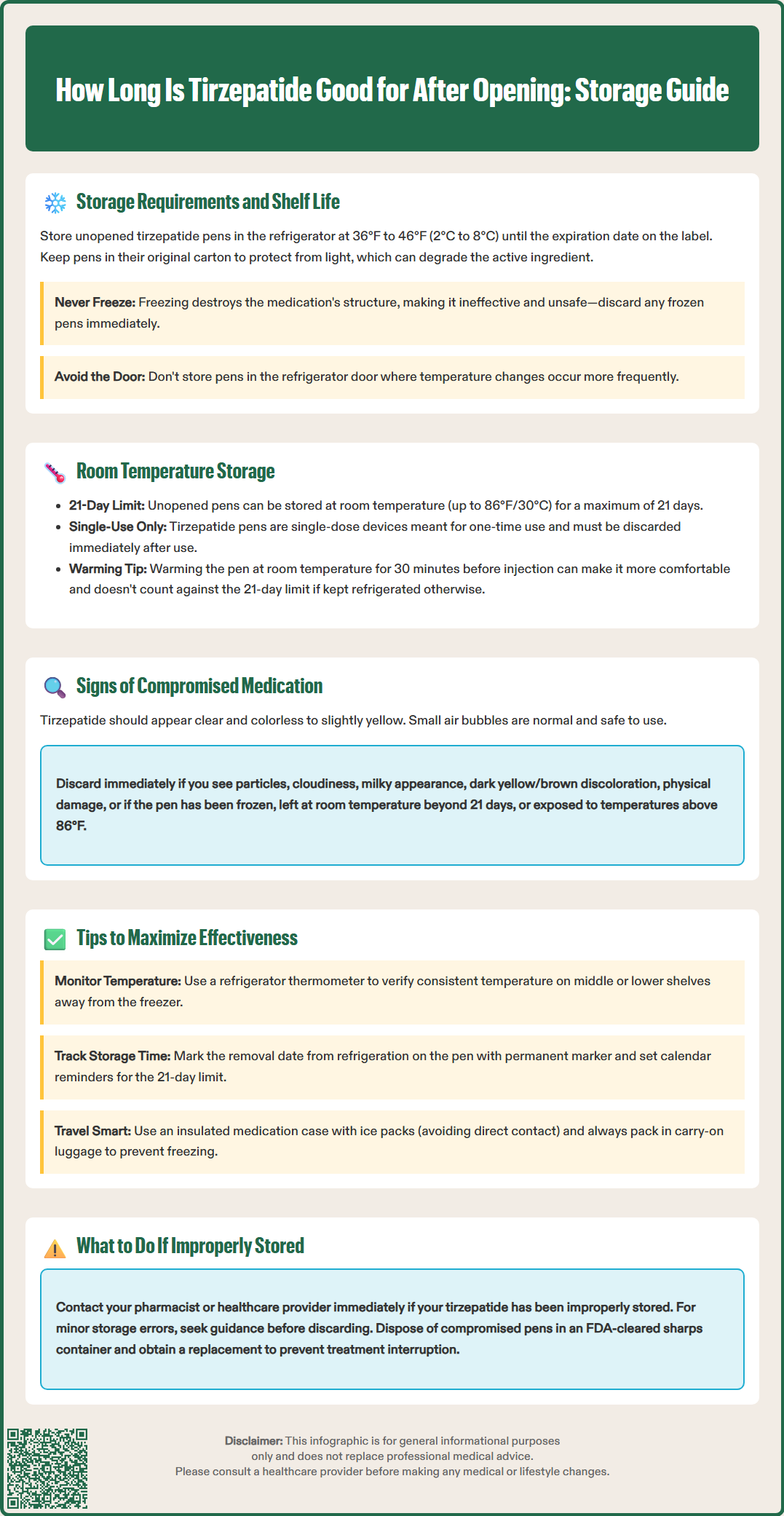LOSE WEIGHT WITH MEDICAL SUPPORT — BUILT FOR MEN
- Your personalised programme is built around medical care, not willpower.
- No generic diets. No guesswork.
- Just science-backed results and expert support.
Find out if you’re eligible

Tirzepatide (Mounjaro, Zepbound) is a dual GIP/GLP-1 receptor agonist approved by the FDA for type 2 diabetes and chronic weight management. Understanding how long tirzepatide remains effective after opening is crucial for patient safety and therapeutic success. However, tirzepatide pens are single-dose devices designed for one-time use only, meaning there is no "after opening" storage period. Each prefilled pen delivers one weekly injection and should be discarded immediately after use. This article clarifies tirzepatide storage requirements, room temperature stability limits, and proper handling practices to ensure medication potency and safety throughout treatment.
Quick Answer: Tirzepatide pens are single-dose devices with no post-opening storage period, as each pen must be discarded immediately after administering one injection.
Tirzepatide (Mounjaro, Zepbound) is a peptide-based medication that acts as a glucose-dependent insulinotropic polypeptide (GIP) and glucagon-like peptide-1 (GLP-1) receptor agonist. It's FDA-approved for type 2 diabetes management (Mounjaro) and chronic weight management (Zepbound). Tirzepatide is dispensed as single-dose prefilled pens that require specific storage conditions to maintain their therapeutic efficacy.
Unopened tirzepatide pens must be stored in a refrigerator at temperatures between 36°F and 46°F (2°C to 8°C) until the expiration date printed on the carton and pen label. The medication should never be frozen; exposure to freezing temperatures can denature the peptide structure, rendering the medication ineffective and potentially unsafe. If a pen has been frozen, it must be discarded even if it later thaws to appropriate temperatures.
The shelf life of unopened tirzepatide pens extends to the manufacturer's expiration date when continuously refrigerated. This typically provides patients with several months to use the medication from the time of pharmacy dispensing. It is essential to check the expiration date upon receiving your prescription.
As a best practice, store tirzepatide pens in their original carton to protect the medication from light exposure, which can degrade the active pharmaceutical ingredient. While not explicitly stated in FDA labeling, many healthcare providers recommend avoiding storage in the refrigerator door, where temperature fluctuations are more common. Proper storage before use is the foundation for maintaining medication potency throughout its intended shelf life.

According to FDA-approved prescribing information, tirzepatide pens are single-dose devices designed for one-time use only. Each pen delivers a single weekly dose and should be discarded after that single use in an appropriate sharps container.
If needed, an unopened tirzepatide pen may be stored at room temperature up to 86°F (30°C) for a maximum of 21 days. This 21-day window begins from the moment you remove the pen from refrigeration, not from when you administer an injection. After 21 days at room temperature, the pen must be used or discarded, even if the expiration date has not passed.
It's important to understand that the 21-day room temperature allowance applies only to unopened pens. There is no "after opening" period because each pen is designed for single use only. Once you administer a dose, the pen should be properly discarded according to the manufacturer's instructions.
For patients following the standard weekly dosing schedule, this means you should only remove a pen from refrigeration when you're ready to use it or if you need to store it at room temperature for convenience prior to your scheduled injection day. If storing at room temperature, keep track of when the 21-day period begins to ensure the medication remains within its stability window.
Many patients find allowing the pen to warm to room temperature for 30 minutes before injection more comfortable. This brief warming period does not count against the 21-day room temperature allowance if the pen is otherwise kept refrigerated.
Recognizing when tirzepatide has been compromised is essential for patient safety and therapeutic effectiveness. Before using your single-dose pen, visually inspect the medication through the pen's viewing window. According to the FDA-approved labeling, tirzepatide solution should be clear and colorless to slightly yellow. The solution may contain small air bubbles, which is normal. Any deviation from this appearance warrants discarding the pen.
Specific warning signs include visible particles, cloudiness, or discoloration of the solution. The presence of floating particles, sediment, or any solid matter indicates potential degradation or contamination. Similarly, if the solution appears milky, hazy, or has changed to a darker yellow or brown color, the medication should not be used. These visual changes suggest that the peptide structure may have been altered through temperature exposure, light damage, or contamination.
Physical damage to the pen device itself also compromises medication integrity. Cracks in the cartridge, a damaged needle attachment site, or a pen that has been dropped from a significant height should be evaluated carefully. If there is any question about the pen's structural integrity, it is safer to obtain a replacement than to risk administering compromised medication.
Patients should also be alert to situations that may have compromised the medication even without visible changes. If an unopened pen has been left at room temperature beyond 21 days, exposed to temperatures above 86°F (such as in a hot car), or frozen at any point, it must be discarded regardless of appearance. The expiration date printed on the pen represents the last date the medication should be used if stored properly; using medication beyond this date is not recommended even if it appears normal. When in doubt about medication integrity, patients should consult their pharmacist or healthcare provider rather than risk using potentially ineffective or unsafe medication.
Implementing proper storage practices ensures that tirzepatide maintains its full therapeutic potency throughout its usable life. For unopened pens, designate a specific location in your refrigerator away from the freezer compartment. As a best practice, the middle or lower shelves toward the back of the refrigerator typically maintain the most stable temperatures. Store pens in their original carton to protect them from light and to keep the expiration date readily visible.
Consider using a refrigerator thermometer to verify that your storage area consistently maintains temperatures between 36°F and 46°F (2°C to 8°C). Some refrigerators have zones that run colder or warmer than the set temperature, and identifying the optimal storage location can prevent accidental freezing or inadequate cooling.
If you choose to store an unopened pen at room temperature, select a location away from direct sunlight, heat sources, and humidity. Bathroom medicine cabinets are generally unsuitable due to temperature and humidity fluctuations from showers. A bedroom drawer, kitchen cabinet away from the stove, or a dedicated medication storage box in a climate-controlled room are better options. Remember that once removed from refrigeration, the pen must be used within 21 days or discarded.
When traveling with tirzepatide, use an insulated medication travel case with ice packs (ensuring the pen does not directly contact ice) or a portable medication cooler designed to maintain appropriate temperatures. For air travel, keep tirzepatide in your carry-on luggage rather than checked baggage, where cargo hold temperatures can drop below freezing.
If you're storing pens at room temperature, mark your calendar or set smartphone reminders for the 21-day limit from removal from refrigeration. Some patients find it helpful to write the date of removal from refrigeration directly on the pen label with a permanent marker. These proactive storage strategies help ensure that each dose of tirzepatide delivers its intended therapeutic benefit.
If you discover that your tirzepatide has been stored improperly, immediate assessment and appropriate action are necessary to ensure your safety and maintain therapeutic continuity. First, determine the nature and duration of the storage error. If the pen has been frozen, exposed to temperatures above 86°F for any period, or left at room temperature beyond 21 days while unopened, it must be discarded regardless of appearance. Do not attempt to use medication that has experienced these conditions, as the peptide structure may be irreversibly damaged even if the solution looks normal.
For less severe storage deviations—such as a pen left at room temperature for several hours when it should have been refrigerated, or brief exposure to temperatures slightly above 86°F—the decision is more nuanced. Contact your pharmacist or the medication manufacturer's medical information line for guidance. They can provide specific recommendations based on the exact circumstances of the storage breach. Many pharmaceutical companies maintain 24-hour information services for healthcare providers and patients to address such concerns.
If you must discard compromised medication, follow proper disposal procedures. Place the entire pen (without disassembling it) in an FDA-cleared sharps disposal container. Do not attempt to remove the cap or otherwise manipulate the pen, as this could increase the risk of needle-stick injuries. Do not throw pens in household trash where they might be accessed by children or pets. Many pharmacies and healthcare facilities offer medication take-back programs that accept unused or expired medications.
To prevent treatment interruption, contact your healthcare provider or pharmacist promptly to obtain a replacement pen. Explain the storage issue and the need for an emergency refill. Most insurance plans and pharmacies can accommodate such situations, though you may need documentation from your provider. If you are between doses and the storage error occurred with an unopened pen, you may have time to obtain a replacement before your next scheduled injection. However, if you are approaching your next dose, communicate urgency to your healthcare team to minimize any gap in therapy, which could affect glycemic control or weight management progress.
No, tirzepatide pens are single-dose devices designed for one-time use only. Each pen delivers one weekly dose and must be discarded in a sharps container immediately after administration.
An unopened tirzepatide pen may be stored at room temperature up to 86°F for a maximum of 21 days. After 21 days at room temperature, the pen must be used or discarded, even if the expiration date has not passed.
Tirzepatide should appear clear and colorless to slightly yellow. Discard the pen if you notice cloudiness, visible particles, discoloration, or if it has been frozen, exposed to temperatures above 86°F, or left at room temperature beyond 21 days.
All medical content on this blog is created using reputable, evidence-based sources and is regularly reviewed for accuracy and relevance. While we strive to keep our content current with the latest research and clinical guidelines, it is intended for general informational purposes only.
This content is not a substitute for professional medical advice, diagnosis, or treatment. Always consult a licensed healthcare provider with any medical questions or concerns. Use of this information is at your own risk, and we are not liable for any outcomes resulting from its use.